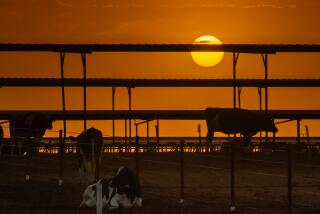L.A. targets illegal cheese
- Share via
For years, relatives of Zeferino Garcia in Mexico’s Oaxaca state routinely sent him a cargo of quesillo cheese by airplane. From Tijuana, the bulk of unpasteurized cheese would be brought to his restaurant and two stores in Los Angeles. Life was good, he thought, and tasty.
“If you don’t have quesillo from Oaxaca, you practically can’t have a Oaxacan restaurant,” said Garcia, 43.
Then three months ago, a health inspector first came to his store and told him he was breaking the law by selling unlicensed, unpasteurized cheese. An inspector returned about a month ago, then again about two weeks ago, when Garcia said he had an “audience” with health authorities.
On Thursday the L.A. city attorney’s office announced the filing of misdemeanor charges against three businesses and their owners, in addition to a store manager, for allegedly selling illegal cheese. Garcia, president of Expresion Oaxaquena Market Inc., was one of them.
Prosecutors said they are going after businesses that sell unpasteurized, unlicensed and often unlabeled cheeses that could contain harmful bacteria. Quesillo is just one that authorities say is often sold or served illegally.
“We’re looking at this as a public health risk,” said Don Kass, a deputy city attorney. “This kind of cheese can cause a serious illness when pathogens are present.”
Health officials say some of it is spirited into the country in suitcases and is then sold door to door to residents or restaurants and at open air markets out of coolers. In other cases, the cheese is made locally in bathtubs. Many consumers don’t know that what they are eating is not regulated, he said.
“The risk of bacteria is worrisome,” said Steve Lyle, a spokesman for the state Department of Food and Agriculture. “This is something our agency works on year around. We believe it’s a significant problem.”
But that doesn’t mean the cheese is unpopular. And many people know its provenance is illegal but think it tastes better. Jonathan Gold, the Pulitzer Prize-winning L.A. Weekly food critic, said he prefers it.
“I will admit that there are some groceries . . . where you do kind of buy cheese under the table, and it tastes better,” Gold said. “If you’re the sort of person who believes milk has a soul to it, which I guess I am, then pasteurizing is taking something away.” As for the potential danger posed by unpasteurized cheese, Gold added: “Life is filled with risks.”
Lyle said unpasteurized cheese and raw milk can be sold legally as long as they are regulated and licensed. But he said the illegal cheese is simply not inspected, making it difficult to tell whether it was made in safe, sanitary conditions.
He said his and other agencies have launched task forces and sweeps to tackle the problem. “If it’s not licensed and inspected, we can’t vouch for the cleanliness of the product,” Lyle said.
As they tried to beat the heat by standing in the shade of a gazebo in Boyle Heights, mariachi musicians Pablo Pulido and Ismael Rojas said that as long as it was made in sanitary conditions, they preferred unpasteurized cheese, whether legal or not.
“When you pasteurize the cheese, you take away from it what nature gave it,” said Rojas, 52, who is from the Mexican state of Guanajuato.
Kass, the deputy city attorney, said Garcia and the three others charged with the sale of illegal unpasteurized cheese -- Faviola Martinez Garcia, Sabrina Aguilar and Maria Justo -- faced thousands of dollars in fines. They could also get up to 100 days of jail time, but he said that was unlikely. “We’re trying to deter others,” Kass said.
Garcia said the situation has indeed deterred him, but only from skirting the law. He said that after the inspectors started coming, he knew he had to find a legal way to get quesillo, also known as queso Oaxaca. It is a lifeblood of his businesses and his Oaxacan culture, he said.
“Our community is very large, and you can’t not have quesillo in a Oaxacan restaurant or even with your family,” Garcia said. “Without quesillo, a Oaxacan fiesta is not a Oaxacan fiesta.”
--
More to Read
Eat your way across L.A.
Get our weekly Tasting Notes newsletter for reviews, news and more.
You may occasionally receive promotional content from the Los Angeles Times.











